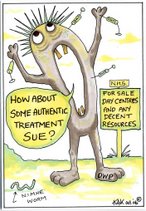Labour of course have typically laboured the point of Patient Choice (health purchasing power for patients) across years . This minor push for Individualised Budgets is actually more consumer driven in thinking in appearances, but Labour do like bureaucracy and central planning , not exactly like "old labour" but more like, lets keep the new corporate bureau classes happy and system delivery under their new corporo-class control ..
In mental health the State is oppressive still massaging the voice of Users with uneeded middle ranks of new bureacracy mediating the User Voices. Its a closed off affair in Trusts with their budgets for the manipulation of the Users-Voice. This half-way system was put in the place of "Patient Choice"- trumpeted by the "experts" who were self appointed in and around the MH charities and NIMHE .. So did Darzi choose to use MH to pilot these small ripples of change ? No he didnt excatly specify ... As the pop song goes "Its a mystery - its a mystery"
Here's the text italicised below put out by NALM, though the information originated with the Health Service Journal -
Do PLEASE note the anti-GP-power , anti-local stance by Labour who want GP's to be more under the control of Foundation Trusts ! Labour, we add , has to be thrown out of power because system delivery twisted up in false and bought off appearances of patient democracy is now more important with them, and they are attacking the GP-Patient relationship too much with the new heavy tanks of Corporo-bureacracy and central planning - its strange to see bad liberalism and sovietism mixed together with deformed hybrid market economics isnt it ?
We would rather eat maggot soup than be around Labour's overcontrolled mess ..
(Text Below Originating From The Health Service Journal )
"The NHS constitution will be published alongside Lord Darzi's report on Monday [30th June 2008]. The constitution will be put out to consultation.
The government is hoping the next stage review will be seen as the successor to the 2000 NHS Plan.
Health secretary Alan Johnson has said the review will be "the most important development in the history of the NHS".
Lord Darzi will announce integrated care pilots. There are expected to be 15, testing a variety of models. However, more complex ones - for instance allowing foundation trusts to provide GP services - are likely to require primary legislation.
Primary care trusts will be told to come up with a plan for their provider arms by the autumn.
HSJ understands recommendations on boosting public involvement in PCTs will be included, following debates during the review of various models, such as foundation trust-style membership.
Acute providers will see a firm commitment to introducing normative pricing in payment by results. The tariff paid would reflect the most efficient rather than the average cost for some treatments.
Lord Darzi's report is expected to announce "pension passports" allowing NHS staff who transfer to social enterprises to keep their NHS pensions.
Lord Darzi is expected to announce the introduction of individual budgets for patients. It is understood there will be £20m available for pilot schemes allowing patients with long-term conditions such as MS or who require NHS continuing care to shop around for their treatments. "
BELOW Extracts from NALM Newsletter June (sorry in advance about the formating it was taken out of a pdf doc )
LINks Members
Patient and Public Involvement in Health and Social Care
Members' Newsletter ☼ June 2008
system running. In many areas new structures have been established and a start made
to begin the task of monitoring and influencing what happens in our local NHS and
social care sectors. The task of rebuilding the capacity to monitor services after the
Government’s second abolition of health care monitoring organisations in five years is
an immense one. NALM has been in the vanguard of demanding that a major
government priority across the country must be high level support for the development
of effective monitoring, inspecting and reporting on health services for patients and
users of social care services.
NALM is busy recruiting across the country and aims to recruit 1000 individual
members by the end of 2008. We are well known for effectively lobbying for
significant improvements to the legislation that established LINks and we are becoming
a driver in the development of the LINKs locally and as a national and regional force.
We have developed a high profile with Ministers, the Department of Health, amongst
parliamentarians, local government, with the Healthcare Commission and many other
national and local bodies. In addition to promoting the development of new effective
community organisations, we are producing information and developing proposals on a
range of health and social care issues, the first of which will be about cancer services
and pandemic flu. We now have a formal legal structure, which should serve us well.
All this has been achieved on a very small budget and with the active and dynamic
support of members across the country. Steering Committee members are working
tirelessly to build the National Association.
Urgent Action: Many private providers are exempted from monitoring by
LINks. These include services contracted before April 1st 2008 by NHS Trust
or PCTs. Please ask your MP to write to the Secretary of State for Health to
request the production of additional Directions from the Department of
Health, to bring all contracts for health and social care within the scope of
LINks.
National Steering Group: North West: John Amos, Audrey Meacock.
North East: Patricia Bottrill, Trevor Gauntlett. East Midlands: Hali Qureshi, Iris
Parker Smith. Yorkshire & Humberside: Ray Crorken, Ruth Marsden.
South West: Bob Maggs, Elli Pang. South East: William Hatton, Len Roberts.
East of England: Anthony Darwood. London: Michael English, Malcolm Alexander
2
The Annual Health Check
The Healthcare Commission (HCC) are committed to obtaining as much data as
possible from LINks members, former Forum members and anyone who has
direct experience of health services (hospitals and PCTs) over the past year.
NALM has agreed to encourage our members to participate in the process. The
HCC are also developing a way to capture experiences (both positive and
negative) from health services users and community/user groups using personal
commentaries. The forms (containing personal commentaries) will be sent to
HCC analysts who will then extract information and give it a data quality and
weighting score. The information will then be fed into the HCC assessment
process and applied to one or more of the core standards.
Urgent Action: Have you information about the effectiveness of services
provided by a local NHS Trust, Foundation Trust or PCT that you have not
yet provided to the Healthcare Commission? Do you know of any patient,
user, carer or voluntary sector group that has something to say about access
to or the quality of health services? If so please send this information to the
Healthcare Commission Head Office or to the Regional Office (shown at the
end of the Newsletter).
HCC, (Head Office), Finsbury Tower, 103 Bunhill Row, London, EC1Y 8TG
020 7448 9200
Monitoring the national picture
To the annoyance of a few local authorities NALM has been gathering
information about their commissioning of Hosts, how they have spent their
money and their progress with fulfilling their statutory obligations. We have
asked every local authority to supply basic information about their progress and
although most have been very happy to supply information, some have claimed
that our expectation that they meet their statutory obligations under the
Freedom of Information Act is too onerous. All of the data that we collect is
being compiled into a report that will be presented to our members, local
authorities, Ministers and the Health Select Committee. We have also offered
to meet with any local authority across the country that wishes to discuss the
development of Hosts and LINks.
Criticisms of NALM. A former Forum member expressed concern that the NALM
has no mandate to act on behalf of LINks and expressed surprise that we are
seeking information about development of LINKs in his area. In the absence of
any national liaison body from April 1st, we believed it was innovative and
wise to set up a co-ordinating body. Had we not done so it might have taken
years for LINks to do what we have done in a few weeks. We are not
attempting to act on behalf of LINks and have no mandate to do so. We are a
body of those LINks members who choose to join us. Early in 2009 when LINks
3
have been established across the country we will hold a national members
meeting and elections will be held amongst all our members.
Our ambition is to support the continuity of PPI, to encourage people to join
LINks, support and advise potential LINks members and provide a vehicle to
influence and advise government in relation to how the new system could be
best supported and services developed. The pace of development is very slow
in some parts of the country and without pressure, some LAs might take a very
long time to get the local LINk going. There is also some very poor practice
across the country, e.g. transitional LINks dominated by PCTs and a failure to
ensure transitional monitoring of health and social care services. Our pressure
and support for local members is making a real difference.
The Audit Commission’s Role in the Creation of LINks
Steve Bundred the Chief Executive of the Audit Commission has the duty to investigate
the effectiveness of the process for creation of Local Involvement Networks (LINks) in
England and has been asked to publish a table of local authority compliance during the
quarter April –June 2008 in the following areas:
1) Date of appointment of “host” organisations, i.e. when the contract passed the
seal of the local authority.
2) Date “host” certifies to the local authority that the LINk has been created.
3) When appropriate, date that the transitional LINk (means of carrying out LINk
duties) was brought into existence by local authority (acting as transitional
host).
4) Details of activities carried out by local authorities through the transitional
LINk, where this has been established to comply with the legislation.
What can LINKs members Enter and View? Major
Loophole in LINks visiting rights in Foundation Trusts.
In addition to adult social care and health services provided directly by the NHS
and Local Authorities, LINks members can "enter and view" publicly funded
services provided by the private sector, but only those for whom contracts
were signed post 1st April 2008. Services contracted between Foundation
Trusts and the private sector are beyond the scrutiny of LINks members. The
position has been clarified by Health Minister Ann Keen:
4
Ann Keen (Parliamentary Under-Secretary (Health Services), Department of
Health; Brentford & Isleworth, Labour)
On 1 April 2008 we issued Directions to organisations commissioning health and
social care services. Under these Directions those organisations must ensure
that new contracts with independent providers allow for authorised
representatives of local involvement networks (LINks) to enter and view, and
observe the carrying on of activities in, premises which are owned or controlled
by the independent provider. The Directions do not apply to NHS Foundation
Trusts.
Urgent Action: Please ask your MP to write to Stephen Hay the Chief
Operating Officer of Monitor requesting that all Foundation Trusts are
obliged to agree to provide LINk members full access to their services for
the purpose of entering, viewing, monitoring and reporting of the quality of
those services.
Stephen Hay, Monitor
4 Matthew Parker Street
London
SW1H 9NP
Stephen.Hay@monitor-nhsft.gov.uk & michael.moruzzi@monitor-nhsft.gov.uk
Some other parliamentary answers
• Monitoring funding for Hosts and LINks: “The level of local authority
contribution to the LINks is a matter for individual councils. Area based
Grant is a non-ring fenced general grant and as such there are no
requirements for local authorities to report separately on how the grant
is utilized”. (John Healey MP Department of Communities and Local
Government
• Funding of LINks: “We have no plans to review the funding allocations
of LINks”.” (Ann Keen MP, Department of Health)
• Indemnity: There are no central arrangements to provide indemnity for
those involved in local involvement networks. This is a matter to be
determined locally”. (Ann Keen MP, Department of Health)
• Expenses for LINk Members: “It is for each LINk to determine its own
policy regarding payment and reimbursement, including the payment of
allowances and expenses. We have reminded LINks and the host
organisations, that the Department’s Reward and Recognition: The
principles and practice of service user payment and reimbursement in
health and social care document provide a useful guide on these
matters”. (Ann Keen MP, Department of Health)
5
• Independence: “LINks will be independent and will have the power to
develop their own priorities and agendas. They will need to develop
relationships with a number of stakeholders to fulfil their statutory
role”. (Ann Keen MP, Department of Health)
• Regional and National Networks: “In certain circumstances LINks may
want to work in partnership to monitor services provided, for example,
cancer networks, mental health services or ambulance trusts, across
more than one local authority boundary. LINks may also wish to work
together in regional groups, or even nationally to share experiences and
findings. There is nothing to prevent LINks using some of their funding to
establish local, regional and national networks if they wish”. (Ann Keen
MP, Department of Health)
Who are the independent providers?
How is a LINk to know (a) which private providers there are on its patch (b)
when their contracts date from and therefore whether they are accessible
to LINk scrutiny?
NALM Vice Chair, Ruth Marsden sent an FOI to the Department of Health asking
for a list of contractors for each NHS and social care body and discovered the
Government doesn’t know. She received the following reply:
Thank you for your email June 4, 2008, requesting, under the Freedom of
Information Act, a list of independent sector providers in England.
The Department does not hold centrally a list of all independent sector (IS)
providers operating in England. Nor does it hold centrally a list of IS providers
providing services to the NHS through local arrangements.
David Winks
Customer Service Centre
Department of Health
freedomofinformation@dh.gsi.gov.uk
We are now writing to all Strategic Health Authorities with a similar request.
No Residential Requirement for Membership of LINks
Misunderstanding about a ‘residential qualification’ for membership of LINks
have been clarified by the Department of Health and the Centre for Public
Scrutiny, which is one of the partners of the National Centre for Involvement
and responsible for production of the guides produced for LINks members:
http://tinyurl.com/5uxtft
Any person can join any LINk in England. This includes people from Scotland,
Ireland and Wales, who can join LINks in England and may wish to do so if they
are receiving care from an English health or social care service. A LINk may
6
decide in its governance arrangements to bar someone from outside its area
from joining, but our advice is that this would probably be unlawful.
However, the big problem is that a hospital group or other Trusts, which covers
a number of local authorities, e.g. the South London and Maudsley Trust in
London, is likely to be monitored by the LINk in which the headquarters of the
organisation falls. This will effectively exclude patients from all the other
boroughs where services are provided by the Trust and prevent proper
discussion by users and the public about service quality. Advice, support,
resources and guidance are badly needed to remedy this huge weakness in
LINks.
A Culture of Secrecy? LINk refused information about
contract with Host
A LINk member who made a Freedom of Information Request(B222 190) to his
local authority requesting information on payments in relation to the contract
for provision of services to the LINK by the Host got the following shocking
reply:
“Unfortunately, the information you have requested is exempt from disclosure
under Section 43 (Commercial Interests) of the Freedom of Information Act
2000 because:
• Disclosure of this information would commercially disadvantage the Host
should they decide to tender for the position of host for any of the other
available contracts in the region.
• Disclosure would unfairly benefit other companies tendering for similar
projects.
• Disclosure would detrimentally affect other authorities who have yet to
complete their tender exercise for a LINK host as the market would be
distorted.
This is a qualified exemption. This means that we have had to apply a public
interest test and balance the public interest in withholding the information
against the public interest in making it available. After careful deliberation,
the balance has been in favour of withholding the information.”
A complaint is being made to the Local Authority and the Information
Commissioner.
7
"Towards a strategy to support volunteering in health
and social Care”
This draft volunteering strategy for health and social care was launched by the
Department of Health in June 2008 and attempts to articulate the key actions
needed to address obstacles to developing a new vision for volunteering in
health and social care. The consultation runs until 30 September 2008 and the
final strategy is expected in early 2009. There are a number of workshops as
shown below: http://tinyurl.com/6fhnvg Gateway number: 9841
Workshop Dates:
East Midlands – To be confirmed
South West – 2nd September 2008
London – 3rd September 2008
North West – 8th September 2008
Yorkshire and Humberside – 11th September 2008
North East – 12th September 2008
South East – 16th September 2008
West Midlands – 23rd September 2008
Eastern Region – 29th September 2008
Bookings forms and contacts for workshops will be available on D of H website
What NALM seeks to do
On April 1st we began building a national, user-led, organisation of LINks
members as well as supporting and advising members during the transition to
LINKs. We are committed to highly effective, inclusive local community
involvement and accountability in health and social care services. We must
make LINks work.
8
The aims of NALM are to:
1. Provide a national voice for LINKs’ members;
2. Promote public involvement that leads to real change and the ability to
influence key decisions about how care services are planned and run;
3. Promote the capacity and effectiveness of LINks’ members to monitor
and influence services at a local, regional and national level and to give
people a genuine voice in their health and social care services;
4. Support the capacity of communities to be involved and engage
in consultations about changes to services, influence key decisions about
health and social services and hold those services to account;
5. Support the involvement of people whose voices are not currently being
heard;
6. Promote open and transparent communication between communities
across the country and the health service;
7. Promote accountability in the NHS and social care to patients and the
public
Our approach is to:
Harness the expertise and knowledge of all those people who have the skills
and knowledge to monitor their local NHS and social care services by creating
effective local LINks:
• Actively encourage the involvement of all local people who are not
currently involved yet have an interest in improving health & social care
• Lobby for adequate funding of LINKs to support outreach and community
development activities
• Build a regional and national infrastructure, fully-funded, to monitor and
develop specialist, mental health, ambulance and paediatric services
• Work with voluntary sectors organisations which specialise in particular
health conditions to improve the effectiveness of local monitoring and
service development
• Be diligent in ensuring that the voices of all local patients and users are
heard loud and clear in the NHS and in social care.
• Put LINk members in touch with each other
•
Action NOW! Get involved, join the LINk, join NALM, collaborate in the
selection of the Host in your area and make sure that a competent host is
selected, that the Host is accountable to members of the LINks and that the
new LINks have the resources and support they need to be effective
9
Health Select Committee:
Please write to the Chair of the HSC or your own MP asking the Committee to
collect evidence and produce a report on the effectiveness of transitional
arrangements for the monitoring of health and social care since abolition of
Patients’ Forums, and the adequacy of the resources, support and monitoring
for the LINk system. The Committee can call Health Ministers and any other
organisations to give oral and written evidence.
• Rt Hon Kevin Barron (Chairman), Rother Valley, barronk@parliament.uk
• Charlotte Atkins, Staffordshire Moorlands, ATKINSC@parliament.uk,
• Peter Bone, Wellingborough, bonep@parliament.uk
• Jim Dowd, Lewisham West, Jimdowd.newlabour@care4free.net,
• Sandra Gidley, Romsey, Gidleys@parliament.uk
• Stephen Hesford, Wirral West, hesfords@parliament.uk
• Dr Doug Naysmith, Bristol North West, naysmithd@parliament.uk
• Lee Scott, Ilford North, scottle@parliament.uk
• Dr Howard Stoate , Dartford, stoateh@parliament.uk
• Robert Syms, Poole, edwardsn@parliament.uk
• Dr Richard Taylor, Wyre Forest, pricemah@parliament.uk
Regional Offices of the Healthcare Commission
Bristol, Dominions House, Lime Kiln Close, Stoke Gifford, Bristol, BS34 8SR
0207 448 8158
Leeds, Kernel House, Killingbeck Drive, Killingbeck, Leeds, LS14 6UF
0207 448 8179
Manchester, 5th Floor, Peter House, Oxford Street, Manchester, M1 5AX
0207 448 9100
Nottingham, Maid Marian House, 56 Hounds Gate, Nottingham, NG1 6BE
0207 448 8188
Solihull, 1st Floor, 1 Friarsgate, 1011 Stratford Road, Solihull, B90 4AG
0207 448 9200
Contacting NALM
Malcolm Alexander – Chair - 0208 809 6552/07817505193
Ruth Marsden – Vice Chair – 01482 849 980/ 07807519933
10
Steering Group Members of NALM:
Region Name Address Email
EAST
MIDLANDS
Iris Parker-
Smith
55 Hillsway
Crescent,
Mansfield
NG18 5DR
Mrs Hali
Qureshi
27 Lucknow
Drive,
Mapperley
Park,
NOTTINGHAM
NG3 5EU
hali.qureshi@btopenworld.com
EAST OF
ENGLAND
Anthony
Darwood
14 Bramerton
Lodge,
Bramerton,
NOWICH NR14
7EQ
anthony.darwood@btopenworld.com
HUMBERSIDE
&
YORKSHIRE
Ray
Crorken
2 Elder Close,
BATLEY
WF17 0DD
ray.crorken@aol.com
Ruth
Marsden
The Hollies,
George St,
COTTINGHAM
HU16 5QP
ruth@myford.karoo.co.uk
LONDON Malcolm
Alexander
30 Portland
Rise,
N4 2PP
maiexa49@aol.com
Michael
English
12 Denny
Crescent,
Kennington,
SE11 4UY
NORTH EAST Patricia
Bottrill
25 Carolyn
Crescent,
WHITLEY BAY,
Tyne & Wear
NE26 3ED
davepatbottie@btinternet.com
Trevor
Gauntlett
133 Donvale
Road,
Donwell,
WASHINGTON
NE37 1DW
NORTH WEST John Amos 15 Carr Hall
Gardens,
BARROWFORD
johnamos15@yahoo.co.uk
11
NELSON.
BB9 6PU
Audrey
Meacock
20 Kelsall
Close, Oxton,
Prenton,
WIRRAL
CH43 2LD.
rob_audreymeacock@btinternet.com
SOUTH EAST William
Hatton
40 Wilmington
Close,
HASSOCKS.
BN6 8QB
billhatton@btinternet.com
Len
Roberts
Ridlands
Farmhouse,
Ridlands Lane,
OXTED.
RH8 0SS
roberts@ridlands.demon.co.uk
SOUTH WEST Eleonore
Pang
10 Yonder
Street,
OTTERY ST
MARY, Exeter.
EX11 1HD
elli@ellipang.wanadoo.co.uk
Bob Maggs 6 Dublin
Crescent
Henleaze
Bristol
BS9 4NA


.jpg)







No comments:
Post a Comment